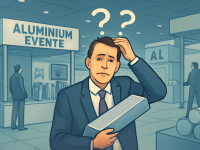ABC – the Aluminium Beverage Can has been on the scene since 1930s and is now the most popular and recycled beverage packaging medium in most parts of the world. The main reasons that have contributed to its longevity and popularity are its easy recyclability over an unlimited number of times and the maximum amount of recycled content –an average of 68 percent. The recycling rate of Used Beverage Cans (UBC) has been found to be over double the rate of that of any other beverage container. Interestingly, the journey of the aluminium can from the recycling bin back to the grocery shelf as a new can takes as little as 60 days. It depends on how sincerely a consumer plays his part to help the can find its way to a recycle bin rather than to a landfill. UBC also forms a significant part of the overall tonnage of resource for the secondary aluminium industry, which in turn goes to meet over one third of the overall demand of aluminium in the world.
USA has recently crossed a milestone in aluminium beverage can recycling. The Aluminum Association, Can Manufacturers Institute (CMI) and Institute of Scrap Recycling Industries (ISRI) announced that the U.S. recycling rate for aluminum beverage containers increased 7%, from 59 percent in 2010 to 65.1 percent for 2011. 61 billion cans were recycled in USA in 2011 and it has been considered a significant step towards achieving 75 percent recycle rate. Higher recycling rates ensure a steady supply of recycled aluminum, which provides overall waste reduction, energy savings and reduces carbon footprint on earth. The US aluminum industry continues its serious commitment to recycling resulting in a steady growth in can recycling, and achieving the highest effective rate in 2012.
The Aluminium Associations Can Committee Chair, Allison Buchanan of Alcoa has recently highlighted some interesting facts behind the growing can recycling rate
“Cans are an obvious green packaging choice because it takes 95 percent less energy to produce a can from recycled material, resulting in significant energy, emissions and resource savings. The amount of energy saved just from recycling cans in 2011 is equal to the energy equivalent of over 17 million barrels of crude oil. That’s the amount of oil needed to fuel more than 1 million vehicles on the road for 12 months…What’s more, these savings can be realized over and over again… That means the cans we recycle after our upcoming Labor Day barbeques will be back on the store shelf as new cans by Halloween….”
The energy saved in recycling one aluminum can is enough to keep a 100-watt bulb lighting for almost 4 hours or run a television for 3 hours. Today’s aluminium can is much lighter and more durable because of advanced manufacturing technology. And as of 2002, 1 pound of aluminum cans is equivalent to about 34 empty cans. Energy used to make aluminum cans has also been reduced 30% over the last 17 years. To encourage can recycling, the aluminum industry in the United States regularly imports used beverage containers (UBCs) from Mexico, Canada and other countries. The import rate has increased considerably to 25 percent in 2011, underlining the need for optimum recycling.
Novelis Inc. USA, a subsidiary of Hindalco Industries Limited and the world leader in rolled aluminum products and UBC recycling have been showing sincere commitment toward delivering sustainability. In its second annual sustainability report, the company reports an increase in the recycled content of its products from 33 percent to 39 percent in 2011. Novelis CEO has also revealed that they are working on a beverage can made of 100% recycled aluminium. The product has been described as the “ultimate sustainable package” currently under development at their innovation center in Georgia.
In terms of recycling rate, Brazil, the largest country in South America, is leading the world for last few years. In October 2010, Henio de Nicola, recycling coordinator for the Brazilian Aluminum Association announced that Brazil had achieved a 96.5 percent aluminum can recycling rate. In 2009, 14 billion tons of aluminum cans were recycled. This success is credited to a dedicated team effort towards independent recycling drives, environmental education programs that create awareness about the advantages of recycling, and above all, the hard work put in by more than 180,000 Brazilians currently engaged in collecting UBCs from all over the country.
As per the latest available figure from European Aluminium Association (EAA), the overall can recycling rate in the Europe has increased by 2.4 percent, to 66.7 percent in 2010. The association has acclaimed the can collection and recycling drives taking place throughout Europe. Hydro has been constantly promoting recycling campaigns in Europe contributing towards the constant growth rate. About 24 billion aluminium beverage cans have been recycled in the year 2010. The EAA expects that the Europeans will be recycling three out of four cans by 2015. The UK recycled 54% of its cans in 2010 with Germany topping the chart at 96% followed by Finland with 95%.
In Asia, consumption of Aluminium beverage can is much lower than that of USA and other Western countries. However, Japan, along with Brazil, has been a global leader in terms of used beverage can (UBC) recycling rates. In 2009, Japan recycled 17 billion cans, which amounts to almost 275,000 tonnes of aluminium. The recycling rate was 93.4% of the total consumption of 300,000 tonnes.
The continued growth in aluminum can recycling rates is a positive trend for the aluminium industry which is reeling under high energy costs, low LME price, regular output cuts and Greenhouse accusations. Recycled effectively, aluminium can be used forever and higher recycling rates not only benefit the industry but also the general economic trends all over the globe. Finally, consumers are recognizing the value of can recycling and contributing actively towards maintaining the cradle to cradle journey of the can and cutting down the carbon footprint on earth.
Reference:
“ALUMINUM CAN EXTENDS LEAD AS MOST RECYCLED BEVERAGE CONTAINER”
[Press release from The Aluminum Association, Can Manufacturers Institute (CMI) and Institute of Scrap Recycling Industries (ISRI)]
http://uspolitics.einnews.com/pr_news/112272433/aluminum-can-extends-lead-as-most-recycled-beverage-container
http://www.ipsnews.net/2010/08/brazil-world-leader-in-recycling-aluminium-cans/
http://www.alueurope.eu/wp-content/uploads/2011/08/Press-Release-Alu-bevcans-recycling-2010final_16July2012.pdf (press release: Aluminium Association)
http://recycling.world-aluminium.org/regional-reports/japan.html















blog.alcircle.com is excellent, good work!
Regards Price Harrison betting
Kell Brook Hector David Saldivia betting odds
Hello.This post was really interesting, especially since I was searching for thoughts on this subject last Sunday.
chanel bags http://chanelbagssale.overblog.com/
Your article was very interesting. We want to set up such a facility in India. Do you know some consultant who can help us?
Hello ,
I am getting inquiries about aluminium scrap import s which is possible for me to fulfill the demand from China
I am looking for import laws and proper guidance as I am new to this industry.
Can you help me please to move about ?
Its great idea for recycling the aluminium can and also its helpful for our environment.